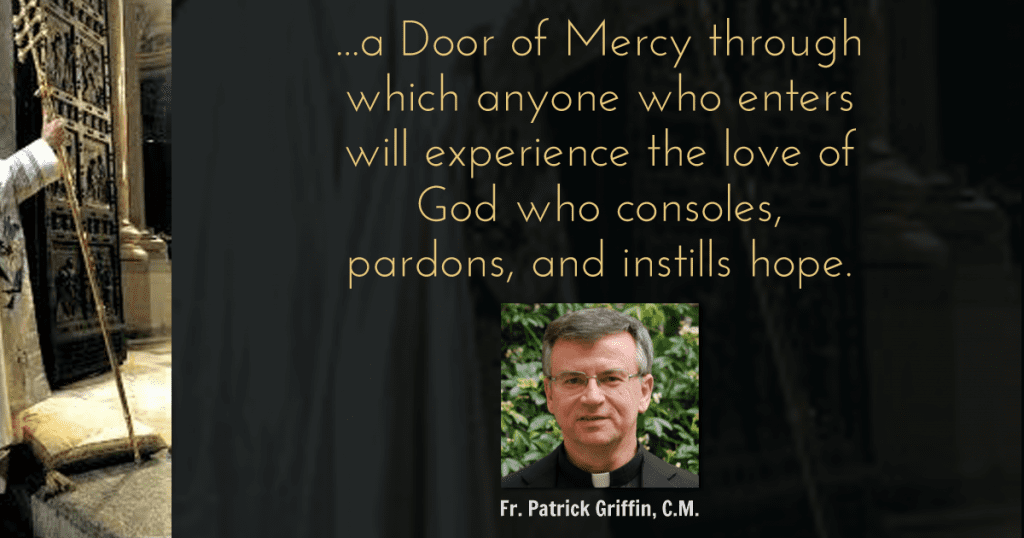
“An Open Door Policy” Considering Consecrated Life:
The images and symbols surrounding the Holy Year of Mercy make my head swim with content and possibility. When my brain slows down, three favored images emerge at this point in my reflection. All of them have a firm connection to the theme of mercy and rest within the Papal Bull introducing this year, Misericordiae Vultus, “The Face of Mercy” (11 April 2015).
I present, therefore, this Extraordinary Jubilee Year dedicated to living out in our daily lives the mercy which the Father constantly extends to all of us. (25)
The practice of pilgrimage has a special place in the Holy Year . . . each according to his or her ability, will have to make a pilgrimage. This will be a sign that mercy is also a goal to reach and requires dedication and sacrifice. (14)
On that day [the Solemnity of the Immaculate Conception], the Holy Door will become a Door of Mercy through which anyone who enters will experience the love of God who consoles, pardons, and instills hope. (3)
Thus, one finds the images of jubilee, pilgrimage and door. Each of the three offers a rich opportunity for reflection and I am tempted to write about all three. They connect with one another. Yet, I will focus upon the idea of a “door.”
Part of the reason for this particular emphasis arises from another document related to the Year of Mercy: the letter of Pope Francis which grants an indulgence to the faithful on the occasion of the extraordinary jubilee of mercy (1 September 2015). The idea of a door shows up beautifully over and over in this rather short and simple document. The effort to hold the door open for everyone flows in a touching and powerful manner.
(The meaning of an “indulgence” for our day would be an interesting and fruitful conversation, but not one for this essay.)
First of all, Francis speaks of the most ordinary case: the faithful person who wishes to participate in this year within the limits of his or her own diocese.
To experience and obtain the Indulgence, the faithful are called to make a brief pilgrimage to the Holy Door, open in every Cathedral or in the churches designated by the Diocesan Bishop.
The Holy Father does not limit this door to only these churches, but they probably represent the ones most commonly available.
Francis thinks of the sick and those confined to their homes who would have great difficulty in making a pilgrimage on their feet. He writes:
Living with faith and joyful hope this moment of trial, receiving communion or attending Holy Mass and community prayer, even through the various means of communication, will be for them the means of obtaining the Jubilee Indulgence.
I love the inclusion of the line regarding the participation in the year through media—perhaps, television, internet, or some other means.
The Pope’s sensitivity to the needs of the incarcerated is evident and thoughtful:
They may obtain the Indulgence in the chapels of the prisons. May the gesture of directing their thought and prayer to the Father each time they cross the threshold of their cell signify for them their passage through the Holy Door.
The Holy Father reminds me of Vincent in this case. Neither makes excuses for those who are in jail, but they both have grave concerns for their spiritual wellbeing.
Those who carry out the corporal works of mercy receive a special blessing. It can also be sought for the benefit of those who have died.
Women who had an abortion and who repent of their sin may expect that the priest whom they encounter in the sacrament of reconciliation can grant absolution. Finally, Francis notes:
Those who during the Holy Year of Mercy approach these priests of the Fraternity of St Pius X to celebrate the Sacrament of Reconciliation shall validly and licitly receive the absolution of their sins.
The priests of the Fraternity of St. Pius X have separated themselves from the universal Church by rejecting Vatican II and the authority of the modern Popes. Francis prays for their return to the Church and grants their penitents clear consciences in the sacrament of reconciliation.
Everywhere that one looks, the Door of Mercy opens wide for all the faithful as well as the separated. A blessing accompanies their willingness to cross the threshold of this portal. The sympathy of St. Vincent and St. Louise for all these people can be discerned in so many of their stories, not only with the prisoners but also the sick, the women who abandoned their children, and even the Jansenists. Understanding and forgiveness accompanied by the grace of God find a place for all. One discerns an “open door” policy with mercy as the key.







0 Comments